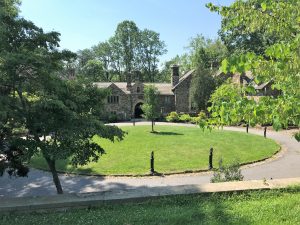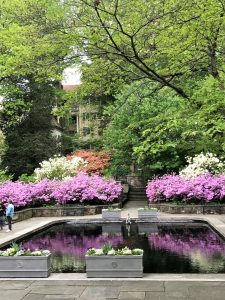Jerusalem is a well-built city; its seamless walls cannot be breached. All the tribes of Israel—the Lord’s people—make their pilgrimage here. They come to give thanks to the name of the Lord, as the law requires of Israel. Here stand the thrones where judgment is given, the thrones of the dynasty of David (122:3-5 NLT).
In these verses of the psalm that King David wrote for the worship of old covenant Israel, we have seen that David encouraged the people to admire the city that God had given to them and to rejoice in the unity of the tribes of Israel in gathering to the place that the Lord had chosen. Place was very important in the physical worship of the law covenant.
When the tribes of Israel gathered to worship God in the appointed place, what did King David direct them to do? He urged them to give thanks to God. Giving thanks to God was an important part of old covenant worship. You can read the following examples from the Psalms (18:49; 26:7; 28:7; 50:14, 23; 75:1; 92:1; 97:12; 100:4; 106:1, 47). David was the great motivator of requiring thanksgiving to God in worship. David appointed some of the Levites to be ministers before the ark of the Lord, to celebrate the Lord God of Israel, and to give thanks and praise to him… On that day David decreed for the first time that thanks be given to the Lord by Asaph and his relatives: Give thanks to the Lord; call on his name; proclaim his deeds among the peoples (1 Chronicles 16:4, 7-8 CSB). New covenant people are also directed by the Holy Spirit to give thanks to God by precept and example (Romans 14:6; 1 Corinthians 1:4; 14:16-17; 15:57; 2 Corinthians 1:11; 4:15; 8:16; 9:11-12, 15; Ephesians 1:16; 5:4, 20; Philippians 1:3; 4:6; Colossians 1:3; 3:17; 4:2; 1 Thessalonians 1:2; 5:18; 1 Timothy 1:12; 2:1; 4:4; 2 Timothy 1:3). If you want to know what fills the worship of heaven, the answer is simple: thanksgiving (Revelation 4:9; 7:12; 11:17).
David also reminded the people the reason for their gathering together: as the law requires of Israel. The way of life for God’s people must always be in conformity with the instruction written in the Holy Scriptures. We must be a people that live by God’s Book. The Spirit of God uses his Word to transform and reshape how we think of God, how we look at the world, and how we make our choices.
Since they were a physical nation, David sang about the throne, his throne as God’s anointed king. In Jerusalem David dispensed justice, and the standard of that justice was the Torah. In it, God gave many laws to set forth justice among his people. David and his successors, his dynasty, was responsible to the Lord for maintaining justice in the nation. Today, we do not look to any mere human to achieve justice in the new covenant nation. We look to the Lord Jesus Christ, great David’s greater Son. And he put all things under his feet and gave him as head over all things to the church, which is his body, the fullness of him who fills all in all (Ephesians 1:22-23 ESV). Lord Jesus, protect your people from oppressors. Bless us with the freedom that you purchased at the cross, and help us to live that others might know your righteousness.
Grace and peace
David

 Good and upright is the Lord; therefore he instructs sinners in the way (Psalm 25:8 ESV).
Good and upright is the Lord; therefore he instructs sinners in the way (Psalm 25:8 ESV). Genesis 44:1-45:3
Genesis 44:1-45:3 Psalm 36:1-12
Psalm 36:1-12 Psalm 9:3-12
Psalm 9:3-12